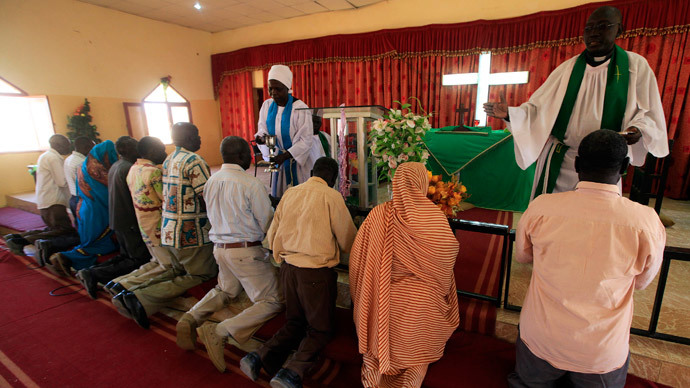Hope for Sudan as Archbishop of Canterbury inaugurates new Anglican province

The Archbishop of Canterbury will inaugurate the 39th province of the worldwide Anglican Communion at a service in Khartoum, the capital of Sudan, on Sunday. Archbishop Justin Welby will also visit Uganda, home to many hundreds of thousands of refugees who have fled violence in the ongoing conflict in South Sudan.
The Anglican church in Sudan has until now been administered from Juba, the capital of South Sudan, which is the world's newest country and which is predominantly Christian.
The new province, formed out of what was previously called the Episcopal Church of South Sudan and Sudan. will be led by the Archbishop of Sunday and Bishop of the Diocese of Khartoum, Ezekiel Kondo.
Sudan is predominantly Muslim and there are restrictions on Christian activity, such as a ban on the building of any new churches. At least five Sudanese Christians were killed last year alone and 12 imprisoned for their faith, according to Open Doors.
Archbishop of Hong Kong Paul Kwong, chair of the Anglican Consultative Council (ACC), said: 'I send my warmest and heartiest congratulations to the Church of Sudan on your inauguration as the 39th Province of the Anglican Communion. The birth of a new member province brings not only joy and excitement to the global Anglican family but also richness, encouragement and hope. We look forward to walking together closely with you to serve as light to the world that leads many into the Kingdom of God and to enable the Word of our Lord to be proclaimed to set many free.'
South Sudan gained independence from Sudan in 2011, the Primate of Sudan and South Sudan, Archbishop Daniel Deng, with the challenge of overseeing two countries. The four and a half million Anglicans are based mainly in South Sudan.
In 2016 a formal application was made to the ACC for the internal province of Sudan to be granted autonomy.
Archbishop Kondo said: 'I would like to say that the Christians and the entire people of Sudan are very much looking forward to welcoming the Archbishop of Canterbury, Justin Welby and Mrs Welby to inaugurate the New Province of Sudan, number 39, which represents 39 Articles of faith of the Anglican Church and the 39 books of the OT! It is my prayer and hope that the occasion will strengthen the church in Sudan for God's glory and extension of His Kingdom.'
Archbishop Josiah Idowu-Fearon, ACC secretary general, said : 'It's a welcome development that we now have another Anglican Province in a predominantly Muslim country. We hope the province will stand and proclaim Christ in a way that will be meaningful in that context. Having Sudan as a separate province of the Communion will benefit Christians in Sudan; now they will know they are not alone, that they are a part of the worldwide Anglican family, a family of 85 million believers.'
Bishop Anthony Poggo, Archbishop Justin Welby's adviser for Anglican Communion Affairs, who is himself from South Sudan, said: 'This is a sign of growth. I don't think any of us think it is going to be easy. There will be challenges. But the challenges will be more easily solved by the people themsleves in Sudan than by an Archbishop based in Juba in South Sudan.'
Archbishop Welby will also visit Kadugli, one of five dioceses in Sudan, where there has been violent conflict. He will open a new office, replacing one that was previously destroyed in the violence.
Sudan is currently Number 5 on the Open Doors world watch list of countries where persecution is most severe. Open Doors reports: 'Sharia (Islamic law) is the foundation of Sudan's legal system, and leaving Islam is punishable by death; Christians are afraid even to talk about their faith in case this is construed as an "act that encourages apostasy". When President al-Bashir wants to gain support his government will often use inflammatory language against the West; Christianity is seen as Western, so this has a knock-on effect on Sudanese Christians.'
International awareness of the problems was raised after the case of Meriam Ibrahim, a young doctor and mother, who was sentenced to death for apostasy even though she had always been a Christian. Sudan counted her Muslim because her father was Muslim. Her sentenced was overturned after international pressure and she now lives in the US, but for many Christians remain in serious danger in Sudan.
Islam became even more deeply embedded in Sudan after the secession of the largely Christian South Sudan, where the ongoing conflicts are tribal and political, rather than religious. Church leaders play an imporant role in peace and reconciliation. Archbishop Justin, who was powerfully affected by his visit to South Sudan in 2014 where he saw bodies of those killed in the conflict that had not yet been buried, believes local church leadership is crucial to this process and that a new, autonomous province for Sudan will empower this for both provinces in both nations.











